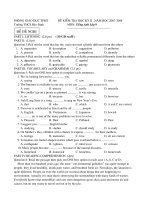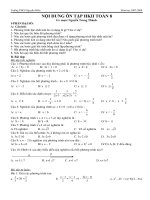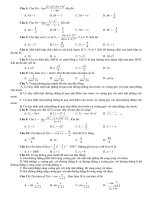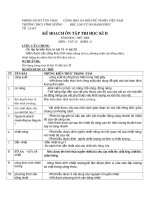ENGLISH TEST on tap HKII 5
Bạn đang xem bản rút gọn của tài liệu. Xem và tải ngay bản đầy đủ của tài liệu tại đây (111.36 KB, 4 trang )
<span class='text_page_counter'>(1)</span>Full name: __________________ Class : _________________ A/ MULTIPLE CHOICE QUESTIONS:. I/ Identify the mistake in the following sentences:.
<span class='text_page_counter'>(2)</span> 1. People practice conversation so that the environment can preserve their needs and the needs of all other living things. A B C D 2. We go to a school almost every day a week. A B C D 3. He studies English in order to want to get a good job in the future. A B C D 4. Unless I don’t tell my son a story, he won’t go to sleep at night. A B C D 5. We were all surprised with how much older the little girl looked. A B C D II/ Read the following passage and choose the best answer to the questions below It is difficult to know how many elephants once lived in the continent, but there may have been at least 3-5 million th elephants in Africa in the early part of the 20 century. People have always hunted elephants for meat, hides and ivory. As the human population grew and weapons became more advanced, elephants were under greater threat. In the late 1970s and early 1980s, there was a huge decline in the number of elephants due to the increase in poaching. It is estimated that there are now about 500,000 elephants and they are living in a small number of countries. A ban was given on all international trade in ivory in 1989, and many governments started to give poachers severe punishments. Thanks to such timely actions, some elephant populations, especially those in southern Africa, have recovered over the last decade. However, numerous threats remain for Africa’s elephants. 6. It is difficult to know … A. why elephants have been poached. B. how many elephants are living now. C. the exact number of elephants that once lived in the continent. D. why elephants were under greater threat. 7. Elephants are hunted … A. because they have nowhere to hide. B. for their meat, skin and ivory. C. so that human population grows. D. b ecause they are very big. 8. During the late 1970s and early 1980s, the number of elephants …. A. increased hugely B. raised too much C. fell slightly D. decreased sharply 9. Nowadays, elephants are found …. A. in all over the world. B. in most of tropical countries. C. in all international trade. D. only in certain countries in the world. 10. The trade in ivory … A. has been prohibited all over the world since 1989. B. has been banned in the early 1980s. C. was forbidden in southern Africa. D. has recovered over the last decade. III/ Choose the word or phrase that best completes the following sentences: 11. In the early days, films were little more than … photographs, usually one minute in length. A. moving B. developing C. playing D. changing 12. My sister … the work before we …. A. finished/had gone out B. finished/went out C. had finished/had gone out D. has finished/went out 13. The boy … how to do the job in such a way. A. was used to tell B. was used to be told C. used to be told D. used to telling 14. It is difficult to imagine … our lives would be like without music. A. how B. if C. what D. that 15. Do you know the lady was awarded … honors degree when she was very young? A. a B. an C. the D. X (no word is needed) 16. If modern technology did not …, we would never have precious information about the undersea world. A. have B. challenge C. provide D. exist 17. If he … to me, we … friends. A. had lied/ wouldn’t be B. lied/were never C. lied/would have not been D. had lied/ can’t be 18. It … that the war finally came to an end. A. was not until in 1975 B. was not until 1975 C. is until 1975 D. was until in 1975.
<span class='text_page_counter'>(3)</span> 19. We are doing … to the environment, aren’t we? A. threaten B. destructive C. lost D. damage 20. X: “Do you think that we are destroying the environment?” – Y: “…” A. Talking rubbish! B. What for? C. Pardon? D. You’re welcome. 21. She walked silently …. A. in order not to want to wake the baby up B. so as not to wake up the baby C. so that she doesn’t wake the baby up D. in order that the baby didn’t want to wake up 22. There’s … wide and varied selection of cheese at this supermarket..
<span class='text_page_counter'>(4)</span> A. a B. the C. an D. X (no word is needed) 23. If you … a skeleton in the cellar, please don’t mention it to any one. A. found B. had founded C. happen to find D. are founded 24. Not until you have done all of your homework … A. that can you go out and play B. that you can go out and play C. can go out and play D. can you go out and play 25. X: “Are you taking an important exam?” – Y: “…” A. Come on, please. B. No, what did you say? C. Yes, how did you guess? D. Yes, I’d be. 26. Without plants, most water would … as soon as it falls, taking away valuable soil. A. give up B. show off C. take up D. run off 27. Music is usually played … special occasions and sets the tone for them. A. on B. in C. at D. during 28. …? – In order to understand how the human body works. A. What do we need to learn chemistry B. What do we need to learn chemistry for C. Why do we need to learn chemistry for D. What for do we need to learn chemistry 29. Scientists are investigating the seabed and bringing samples of marine life back to the surface for …. A. further study B. study farther C. farther study D. study further IV/ Read the following passage and choose the most suitable option among A, B, C and D to fill each numbered blank Conservation (30) … a concern for the quality of the environment, so that people can enjoy living in it. It means (31) … it healthy and safe – and an interesting place to live in. A healthy environment also includes clean streets and highways, (32) … open spaces in cities for parks and playgrounds. Ideal surroundings means landscapes (33) … of junk and litter. They include regions of wilderness where animals and plants can be protected from the destructive influence of human (34) …. 30. A. includes B. consists C. forms D. makes 31. A. keep B. to keep C. keeping D. kept 32. A. that B. with C. have D. which 33. A. free B. full C. plenty D. fond 34. A. man B. men C. being D. beings V/ Choose the word whose stress pattern is different from the others: 35. A. different B. festival C. imagine D. popular 36. A. integral B. develop C. existence D. establish 37. A. divide B. threaten C. effort D. program VI/ Choose the word whose underlined part is pronounced differently from the others: 38. A. appear B. nearly C. tear D. idea 39. A. heard B. heart C. determine D. prefer 40. A. please B. music C. practice D. because B/ WRITING: VII/ WORD FORM: 41. Since the end of the 1920s, a new cinema form has appeared, the ………………. cinema. MUSIC 42. Many countries have become ……………….. on imports of oil. DEPEND 43. She seemed to………….. … forget about his birthday. COMPLETE 44. Music can express feelings, such as …………….., hate, love or friendship. ANGRY 45. We had difficulty in …………… you living without your parents’ support. IMAGINE VIII/ Finish the following sentences, using the word given 46.He didn’t return home from work until it got dark. → It was not until it . . . . . . . . . . . . . . . . . ……………….. 47. She has not won any prizes since 2008 → She last . . . . . . . . . . . . . . . . . . . . . . . . . . . .. . . . . . . . . . . . . . . . . ………. 48. I lied to her because I didn’t want to upset her. → I lied to her so . . . . . . . . . . . . . . . . . . . . . . . . . . . . . . . . . . 49. I advised you to get up early every day. → If . . . . . . . . . . . . . . . . . . . . . . . . . . . . . . . ……………………. 50. She hadn’t seen him for over 10 years. → It . . . . . . . . . . . . . . . . . . . . . . . . . . . . . . . . . . . since she had seen him..
<span class='text_page_counter'>(5)</span>









